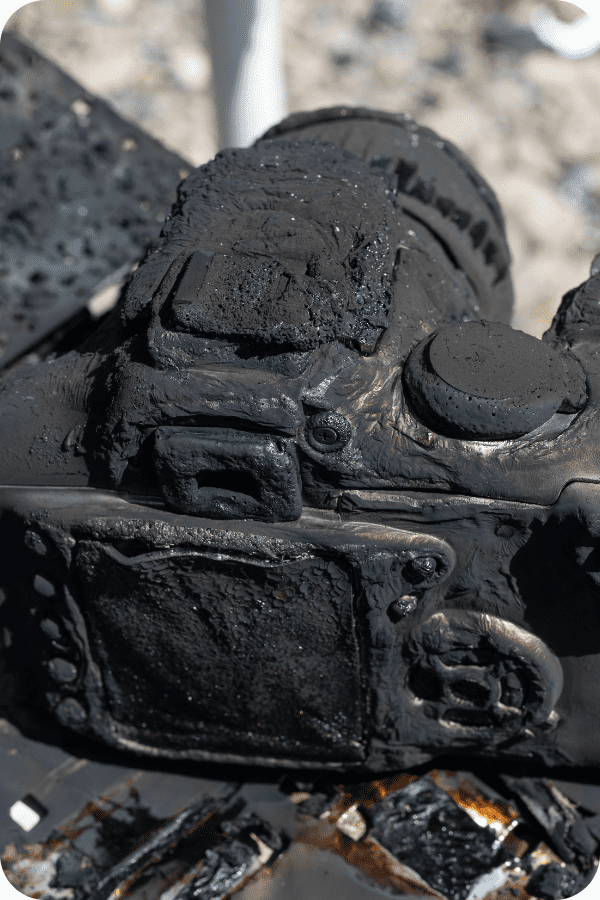- Total65
- Facebook14
- Pinterest15
- Email36

Are you a professional photographer?
The line is somewhat blurred between amateur and professional photographers. Many photographers struggle with when to call themselves professionals due to imposter syndrome, etc.
But it boils down to this…if you’re charging money for photography, you’re a professional photographer and you need to have insurance.
Let’s look at how to get insurance as a photographer and what you need.
Why Do Photographers Need Insurance?
When you pick up your camera and start snapping pictures, the list of things that could go wrong is probably far from your mind.
But the reality is that you might drop your camera in the ocean or someone might steal it. And you’re probably already keenly aware of how much it will cost to replace your equipment.
You might also be surprised at the kinds of things you could be responsible for financially when you start working as a photographer.
For example, you could be sued for causing injury if someone trips over your light stand and hurts themselves. Or if a client is unhappy with the photos you took of their wedding, they might sue you for ruining their wedding day.

While some of the reasons someone could sue you sound frivolous, they still pose a very real risk. If the court finds that your client suffered a loss because of your error, you could be on the hook to pay.
Furthermore, even if you aren’t found guilty, you may still be stuck with defense costs. And everyone knows that legal fees are astronomical.
What Insurance Do You Need?
This being said, not all insurance is created equal. There are a few different types of insurance that photographers should have. Let’s look at the basics here.
1. General Liability
General liability is all-around insurance that protects you in case someone is injured or there is property damage as a result of your activity. Here are a few examples of how general liability insurance can protect you.
Accidents/Injuries
Sometimes your work as a photographer means setting up equipment like light stands, C-stands, etc. Even just having your camera bag lying on the floor unattended is a potential trip hazard.
As silly as it sounds, this opens you up to a potential lawsuit. If someone trips over your equipment and hurts themselves, you could be held responsible for medical costs, etc.
What if you tell someone to climb up on a rock and pose? If they fall and hurt themselves, they could file a claim against you for their medical bills.
Slander/Libel/Defamation
Have you ever worked with celebrities or other high-profile clients? While this can be exciting, it also opens you up to potential legal problems.
For example, what if you or one of your employees post something unfavorable online about the celebrity or just plain gossip about them? They could sue you for defamation of character, etc.
General liability may help cover defense and settlement costs in this situation.
Property Damage
The final area where general liability insurance helps is if you (or an employee) damage something of the client’s.
If you are shooting on location at the client’s home or business, what happens if you knock over their priceless porcelain vase?
Yep, you could be responsible to pay for it. And some people have some really expensive stuff.

2. Professional Liability
Professional liability insurance is important for all businesses to have.
What if you make a major mistake? For example, you accidentally erase a memory card full of wedding photos before they’ve been backed up. Or you miss a very important detail the client specified they wanted before the shoot.
Professional liability insurance protects your business in these instances. Your client may sue you saying that you didn’t deliver the agreed-upon services or just because they are plain unsatisfied for one reason or another.
The error on your part may be real or perceived. Let us assure you that the court costs you’ll have to pay will be very real and having insurance to cover them is very nice.

3. Business Property Insurance
Finally, there is business property insurance. This protects you from accidents happening to your own gear. You know how much photography gear costs. Sometimes it feels like you bleed a little when you buy a new body or lens.
Imagine how gutted you would be to discover someone stole your whole bag of gear! Or that it fell in the ocean or you drop your favorite lens on concrete…and the list goes on.
Though you are always careful with your equipment, accidents can happen at any time. This type of insurance will help replace your lost/broken/stolen gear.
Additional Insurance
Of course, these aren’t the only types of insurance you can have, just the most important ones. These next two types of insurance aren’t mandatory, but they are nice to have if the situation applies to you.
1. Electronic Data Loss Insurance
Technology is great, but it isn’t perfect!
Computers fail, hard drives get dropped, memory cards are corrupted, and even tragic events like fires or floods can cause electronic data loss. While all professional photographers should have some kind of backup and redundancy systems in place, sometimes this isn’t enough.
What do you do if this happens to you?
Well, you could be on the hook with your clients for thousands of dollars depending on the type of data you lose. It’s nice to have electronic data loss insurance on your side in those cases.
Keep in mind that this insurance is only for data loss due to equipment failure or problems mostly out of your hands. User error or accidental deletion is not included.
2. Business Auto Insurance
Most photographers use their personal vehicles for business-related tasks. However, personal auto insurance technically only covers you while driving to and from work. If you are using your vehicle for business-related tasks, you may not be covered adequately in case of an accident.
Furthermore, if you have employees driving cars for your business (even their own personal cars) you should have business auto insurance. This includes driving equipment, other workers, or materials to a shoot location, etc.

Where to Look for Insurance
Now you know what types of insurance you should have as a professional photographer. Where should you look for it?
There are plenty of options out there, but here are some ideas to get you started.
1. Speak With Your Current Auto and Home Insurance Agent
Depending on your insurance company, you may be able to get insurance through a company you’re already using. Many big companies have several divisions offering personal as well as business insurance options to their customers.
It’s possible you might even qualify for a multiple-policy discount by having several types of insurance with the same company.
Even if your company doesn’t have a business division that can help you, your agent can offer a recommendation of where to look.
2. Hiscox
For small businesses, Hiscox is a great insurance company to turn to. It is the business insurance wing of Progressive insurance and offers affordable insurance that is perfect for photographers.
The company offers policies geared toward companies with 0 – 10 employees, which is exactly what most independent photographers are looking for. Everything can be handled online and the company offers specific discounts for home-based businesses purchasing multiple policies.

3. PPA (Professional Photographers of America)
Another great resource is the PPA or Professional Photographers of America. Are you already a member of the PPA (or have you considered joining?)
This trade association offers a wealth of business resources to photographers from business tools and networking events to continuing education opportunities.
Up to $15,000 of equipment coverage is included in a membership with the PPA. Data loss and dissatisfied client protection is also included.
Plus, there are various affordable options for upgrading to more coverage. This includes General Liability insurance at a discount, an individualized business owner’s policy, and more.

Protect Yourself and Your Business!
The world of photography isn’t all pretty pictures. Unfortunately, there are some serious disasters that can happen that you could be financially responsible for as a result of your business activities.
In some cases, it is enough to ruin your business and potentially your personal finances as well!
Even if you don’t feel like a professional photographer, if you are charging people money for photography services — you’re a professional. It’s a great way to turn your passion into an income, but it also opens you up to lawsuits and other expensive problems.
The best way to handle these issues is to protect yourself from the beginning with the proper insurance!
- Total65
- Facebook14
- Pinterest15
- Email36




